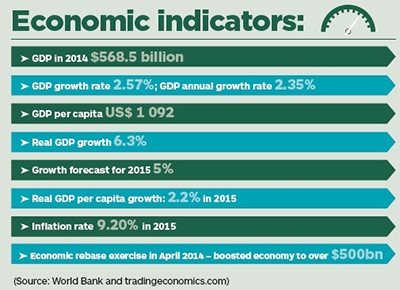
The rationale to setting up a business in Nigeria is generally the same as would be applied anywhere in the world. Prospective operators have to complete due diligence and comply with specific regulation. The advice is generally to conduct a thorough research of the market to understand the dynamics, nuances and other factors that would impact on business and trade.
However, as the editor of techcabal Bankole Oluwafemi explains, in Nigeria, you may have to prepare for double the burn rate and double the set-up time...infrastructure and policy are still major weak points and affect the country's ease of doing business.
According to the World Bank Group's Doing Business evaluation and economic ranking, Nigeria finds itself in 170th place out of 189 countries ranked. This is an improvement on its 2014 ranking of 175th position.
Nigeria also scores higher when it comes to starting a business - with a 2015 ranking of 129th position compared to 138 last year. There has been a significant increase in the country's rating when it comes to securing credit, with a climb of 73 positions - from 125th position in 2014 to 52 in 2015.
However, it has dropped positions on the index in areas like paying taxes, enforcing contracts, resolving insolvency and protecting minority investors.
Oluwafemi says while many foreign companies, including Google, IBM and Oracle, have managed to successfully establish local presence, many global ventures hoping to penetrate the market have opted to partner with local businesses as the best route to market.
From a logistics and physical operations point of view, much depends on target market, focus and nature of business, says Oluwafemi, but it's generally advisable to tick as many items off the list as quickly as possible.
"Even if you don't have an office, you will definitely need some sort of address... the rise of shared offices and co-working, especially in Lagos, is making this easier to navigate. A lot of the regulations are sensible to ensure that things are done properly, but somehow you feel they could have been designed better. For instance, it can take weeks to incorporate. In Rwanda, it takes a few hours. Opening bank accounts is a really tedious process," he adds.
Dan Agbor, managing partner at Udo Udoma & Belo-Osagie in Lagos, which works closely with African corporate and commercial South African law firm Bowman Gilfillan, says, generally, there are very few restrictions on the ability for foreign nationals to hold shares in Nigeria.
Open for business
"There are a few sector-specific restrictions, where there are local content-type restrictions, like in the oil and gas industry. But in terms of general business, banking and in the ICT space, we don't have any such restrictions. You can come in and set up a 100-percent foreign-owned business. There is also no requirement that you have to have local directors."
Once a business is set up, in some industries, there is a need to employ foreign nationals and to do this, it's necessary to apply for and secure an expatriate quota.
Businesses that have foreign shareholding assets in Nigeria also have to secure a business permit, which Agbor describes as a fairly routine piece of documentation.
Another important aspect to remember is to secure a licence from an industry regulator. For would-be telecommunications and ICT businesses, this means having to obtain a licence from the Nigerian Communications Commission (NCC).
However, aside from these general business practices and relevant permits, Agbor also stresses the importance of the CCI (Certificate of Capital Importation). This document becomes particularly relevant when businesses want to extract dividends on investment from the country or deposit investments.
They have the green light to do so, as long as they are in possession of this certificate.
As far as contracts and government tender opportunities are concerned (with the exception of the oil and gas industry), the tender process is open to any business - as long as the business pursuing the tender has been incorporated in Nigeria.
This article was first published in Brainstorm magazine. Click here to read the complete article at the Brainstorm website.
Share